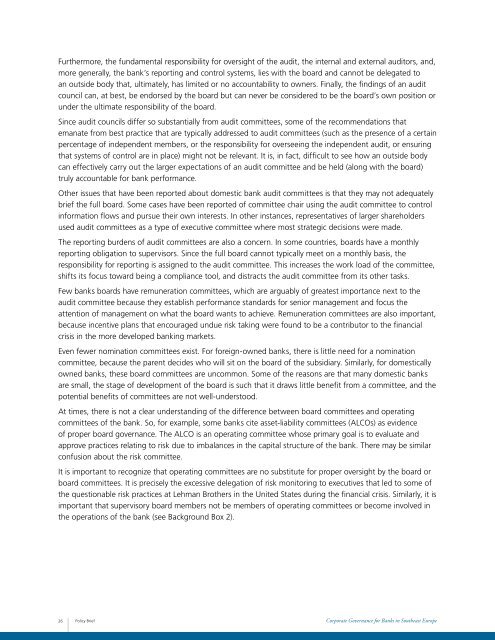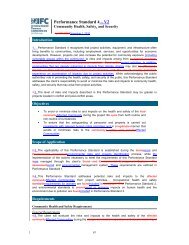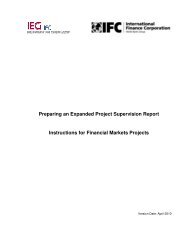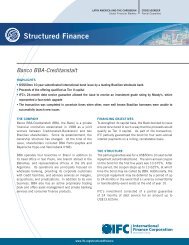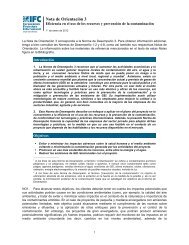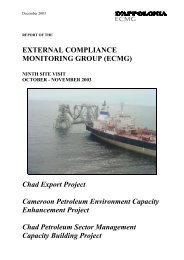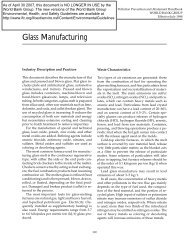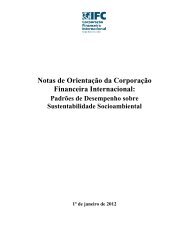Corporate Governance for Banks in Southeast Europe: Policy - IFC
Corporate Governance for Banks in Southeast Europe: Policy - IFC
Corporate Governance for Banks in Southeast Europe: Policy - IFC
Create successful ePaper yourself
Turn your PDF publications into a flip-book with our unique Google optimized e-Paper software.
Furthermore, the fundamental responsibility <strong>for</strong> oversight of the audit, the <strong>in</strong>ternal and external auditors, and,<br />
more generally, the bank’s report<strong>in</strong>g and control systems, lies with the board and cannot be delegated to<br />
an outside body that, ultimately, has limited or no accountability to owners. F<strong>in</strong>ally, the f<strong>in</strong>d<strong>in</strong>gs of an audit<br />
council can, at best, be endorsed by the board but can never be considered to be the board’s own position or<br />
under the ultimate responsibility of the board.<br />
S<strong>in</strong>ce audit councils differ so substantially from audit committees, some of the recommendations that<br />
emanate from best practice that are typically addressed to audit committees (such as the presence of a certa<strong>in</strong><br />
percentage of <strong>in</strong>dependent members, or the responsibility <strong>for</strong> oversee<strong>in</strong>g the <strong>in</strong>dependent audit, or ensur<strong>in</strong>g<br />
that systems of control are <strong>in</strong> place) might not be relevant. It is, <strong>in</strong> fact, difficult to see how an outside body<br />
can effectively carry out the larger expectations of an audit committee and be held (along with the board)<br />
truly accountable <strong>for</strong> bank per<strong>for</strong>mance.<br />
Other issues that have been reported about domestic bank audit committees is that they may not adequately<br />
brief the full board. Some cases have been reported of committee chair us<strong>in</strong>g the audit committee to control<br />
<strong>in</strong><strong>for</strong>mation flows and pursue their own <strong>in</strong>terests. In other <strong>in</strong>stances, representatives of larger shareholders<br />
used audit committees as a type of executive committee where most strategic decisions were made.<br />
The report<strong>in</strong>g burdens of audit committees are also a concern. In some countries, boards have a monthly<br />
report<strong>in</strong>g obligation to supervisors. S<strong>in</strong>ce the full board cannot typically meet on a monthly basis, the<br />
responsibility <strong>for</strong> report<strong>in</strong>g is assigned to the audit committee. This <strong>in</strong>creases the work load of the committee,<br />
shifts its focus toward be<strong>in</strong>g a compliance tool, and distracts the audit committee from its other tasks.<br />
Few banks boards have remuneration committees, which are arguably of greatest importance next to the<br />
audit committee because they establish per<strong>for</strong>mance standards <strong>for</strong> senior management and focus the<br />
attention of management on what the board wants to achieve. Remuneration committees are also important,<br />
because <strong>in</strong>centive plans that encouraged undue risk tak<strong>in</strong>g were found to be a contributor to the f<strong>in</strong>ancial<br />
crisis <strong>in</strong> the more developed bank<strong>in</strong>g markets.<br />
Even fewer nom<strong>in</strong>ation committees exist. For <strong>for</strong>eign-owned banks, there is little need <strong>for</strong> a nom<strong>in</strong>ation<br />
committee, because the parent decides who will sit on the board of the subsidiary. Similarly, <strong>for</strong> domestically<br />
owned banks, these board committees are uncommon. Some of the reasons are that many domestic banks<br />
are small, the stage of development of the board is such that it draws little benefit from a committee, and the<br />
potential benefits of committees are not well-understood.<br />
At times, there is not a clear understand<strong>in</strong>g of the difference between board committees and operat<strong>in</strong>g<br />
committees of the bank. So, <strong>for</strong> example, some banks cite asset-liability committees (ALCOs) as evidence<br />
of proper board governance. The ALCO is an operat<strong>in</strong>g committee whose primary goal is to evaluate and<br />
approve practices relat<strong>in</strong>g to risk due to imbalances <strong>in</strong> the capital structure of the bank. There may be similar<br />
confusion about the risk committee.<br />
It is important to recognize that operat<strong>in</strong>g committees are no substitute <strong>for</strong> proper oversight by the board or<br />
board committees. It is precisely the excessive delegation of risk monitor<strong>in</strong>g to executives that led to some of<br />
the questionable risk practices at Lehman Brothers <strong>in</strong> the United States dur<strong>in</strong>g the f<strong>in</strong>ancial crisis. Similarly, it is<br />
important that supervisory board members not be members of operat<strong>in</strong>g committees or become <strong>in</strong>volved <strong>in</strong><br />
the operations of the bank (see Background Box 2).<br />
26<br />
<strong>Policy</strong> Brief<br />
<strong>Corporate</strong> <strong>Governance</strong> <strong>for</strong> <strong>Banks</strong> <strong>in</strong> <strong>Southeast</strong> <strong>Europe</strong>


